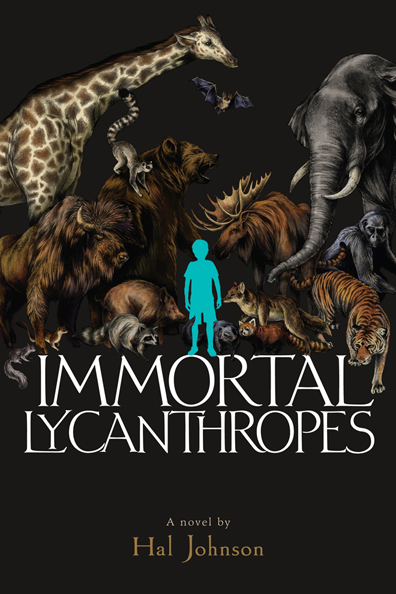 Review Fix chats with “Immortal Lycanthropes†author Hal Johnson, who discusses his influences for the book, what he read as a kid and how he’d like the work to be remembered.
Review Fix chats with “Immortal Lycanthropes†author Hal Johnson, who discusses his influences for the book, what he read as a kid and how he’d like the work to be remembered.
Review Fix: What was the inspiration behind Myron Horowitz?
Hal Johnson: The short answer is: Jim Hawkins! Actually, Myron owes a lot to all the plucky heroes of the adventure books I read as a kid. They were always a bit too plucky to be believed though; they were also too certain of themselves, as only a generation from before World War I can be. I wanted Myron to be, if not more realistic (characters in novels are never realistic) then at least a little closer to the level of panic I would have felt in similar circumstances.
Myron’s an inveterate reader of adventure novels, so he has the advantage of not finding some of the things that happen to him unprecedented. Fifty years ago or more Edward Eager wrote children’s books about kids who had themselves read E. Nesbit’s Edwardian-era children’s fantasies, and who were therefore able to start their own adventures with magic and strangeness from a position of superior knowledge. Myron certainly believes that he has an advantage over Jim Hawkins because he’s more knowledgeable about the kinds of adventures a kid his age can have; I think he’s quickly disabused of that notion, the notion that his knowledge can save him.
Of course, Myron is much uglier than Jim Hawkins, or just about anyone else. Some early readers took me to task for this, and one of the most common questions I get at readings is: “Why did you make him so ugly?†I guess it was because I wanted to have things be tough for Myron—things should always be tough for the protagonist, right?—and nothing’s tougher than being wicked ugly.
Also, everyone, in ninth grade, feels alienated and alone. It’s part of a novelist’s goals, I think, to reify feelings like that. So if your character’s going to feel ugly or isolated, jack up his face. Also, make him an immortal lycanthrope. That’s got to be an isolating experience.
Review Fix: What was the writing process like?
Johnson: Once I had the basic idea, I broke the book down into chapters, and gave each one a stupid, descriptive title. Like, “Myron Hangs Out in the Woods with a Moose,†something that on point. That was just to help me pace it, and eventually I ended up splitting some chapters into two, when I had a better idea of what they entailed. But with this breakdown in place, I felt more comfortable hammering it together one chapter at a time. I work in a comic book store, so every day at the register I’d jot down ideas as they came to me for what I wanted to have happen in the chapter I was working on. After a few days, I’d have a big list of things, and I’d put them in order, and suddenly I had an outline.
 I found this worked really well for a picaresque novel like Immortal Lycanthropes, but it does not work as well for other kinds of books. Every time I write something, it seems like I have to figure out a new method of writing that works for that book.
I found this worked really well for a picaresque novel like Immortal Lycanthropes, but it does not work as well for other kinds of books. Every time I write something, it seems like I have to figure out a new method of writing that works for that book.
Review Fix: Was there ever a time when you thought the book may never be completed?
Johnson: There’s always something getting in the way of whatever you want to do, right? I took a big break about halfway through the book to deal with the horrors of the real world. But really, once I build up enough steam, it’s hard to get me to stop. There were probably times when I thought the book would never be started, but a hundred pages of inertia never really ceases pushing you forward.
Review Fix: How’d you feel when the reviews began to come in?
Johnson: It’s weird, because I think most of us can go years and years without ever getting any kind of critique from a stranger. Having your friends read your work, even if they’re harsh and honest people—their words are always refracted through some lens of affection for you. I mean, at the very least they have to be civil. I used to be in a band, and after a show, if people came up to me and told me they liked it—well, if they didn’t like it, they weren’t going to say anything.
So it’s a bracing difference when you do something that’s large enough to garner attention from online reviewers. I was really prepared for the worst. I think I’m enough of a jerk online to authors I hate—I’m looking at you, Dan Brown—that I couldn’t even complain if people chose to eviscerate the book and take pot-shots at my personal life. But I guess there are parts of the internet that are not like YouTube comments, parts where people are trying to mimic the register of professional reviewers. So even readers who didn’t like the book didn’t try to raise a lynch mob against me or anything. I’d be pretty upset if I got attacked by a lynch mob.
At first, though, the reviews were disheartening because so many early ones were from anxious mothers, writing more or less, “I don’t think my 13-year-old son should be reading a book with the word ‘erection’ in it.†Your 13-year-old son? Lady, what do you think he’s using as a bookmark? But eventually the book found its way into the hands of less-fretful people, and things evened out.
 Really, there’s nothing quite as gratifying as reading a review where it’s clear the reviewer took the time and really thought about your writing. I’ve been a professional book reviewer, and I know, with deadlines looming, how hard it can be to linger over the book. But books were made for lingering, and it’s someone who’s pored over and lived with a book that can judge it the best. If you get one of those guys writing a review, you know you have to listen to what they say.
Really, there’s nothing quite as gratifying as reading a review where it’s clear the reviewer took the time and really thought about your writing. I’ve been a professional book reviewer, and I know, with deadlines looming, how hard it can be to linger over the book. But books were made for lingering, and it’s someone who’s pored over and lived with a book that can judge it the best. If you get one of those guys writing a review, you know you have to listen to what they say.
Review Fix: What’s your favorite part/element in the book?
Johnson: There’s a section in the middle where Myron spends some time at a big mansion called the Fortress of the Id, and those are my favorite chapters. In part it’s because I like the relationships between Myron and the people in the fortress—the way Myron and Mignon Emanuel seem to like and respect one another, for example, although she manipulates him and he plots against her—but it’s also because it’s in those chapters that more of the world the book takes place in becomes clear.
Myron keeps getting hints of the world around him, but of course he doesn’t understand all of what he sees and hears, and I wanted the reader to have a similar sense of things. There are an awful lot of secret societies, alchemical secrets, and occult pseudosciences in the book, and some things are examined and explained in detail, and some things only appear in passing. It’s important to me, when I read a book, for the world it takes place in to feel full—nothing’s worse than a book with no room for the world in it, and I was so frustrated when I read Oliver Twist because it felt like there were only like eight people in London, appearing again and again. The world of Immortal Lycanthropes is a strange world only apparently similar to our own, but it was important to me that it feel just as alive and jam packed as ours is. So the part of the book where the world feels vast, that’s my favorite part.
Review Fix: Who do you think you relate to most in the book? Why?
Johnson: Umberto Eco once wrote, “with whom does an author identify? With the adverbs, obviously.†I think that’s pretty funny.
I come prejudged to the stand on this one, because everyone, and I mean everyone, who knows me has declared that the narrator and I are pretty much indistinguishable. This cannot be literally true, but one reader pointed out that his name, Arthur, is a short hop from “author.†My conscious brain, at least, did not intend that.
Review Fix: Myron simply has no luck with finding help from anyone in the book. What was the reason for that?
Johnson: Yeah, so thing about writing a book for young adults when you yourself are no longer a young adult, is that you need to try to remember what it was like to be a young adult. And when I was remembering, one of the first things brought to mind was the fact that when you’re a kid, no adult is going to help you do anything ever. That’s probably not literally true, but that’s what it feels like.
The grownups in the book run a gamut from well-wishing through manipulative to outright malevolent, and I think it’s in a pretty realistic gamut. But they’re certainly not going to be helpful.
Review Fix: This book seems a perfect fit as a video game or a comic book. Do you have any plans to branch it out?
Johnson: I wouldn’t call them plans, since if vague desires were the same as plans we’d all be guilty of conspiracy to commit murder. But basically, if you work for a comic book company or video game company, please contact me right away.
Review Fix: You told the Times Ledger that your audience is probably weird smart kids. Have any adults reached out to you and told you what they thought of the book?
 Johnson: I see a lot more adults in my life than I do kids—not because I have any kind of restraining order against me, but just because I work in a comic book store, and we live in a strange time when kids don’t read comics. So I get a lot more feedback from grown-ups than from younger people. I’ll admit that it’s especially gratifying when I meet a kid who’s a fan—they’re the intended audience after all—but plenty of adults have read it as a straight adventure yarn or fantasy novel.
Johnson: I see a lot more adults in my life than I do kids—not because I have any kind of restraining order against me, but just because I work in a comic book store, and we live in a strange time when kids don’t read comics. So I get a lot more feedback from grown-ups than from younger people. I’ll admit that it’s especially gratifying when I meet a kid who’s a fan—they’re the intended audience after all—but plenty of adults have read it as a straight adventure yarn or fantasy novel.
When I was a young adult I didn’t read young adult books, what few there were back then—I read science fiction and fantasy. So although this is a YA book, with a young protagonist and almost no swear words, in my heart it’s really just an SF book. I mean, I think if you’re a grown-up, I think you’ll be able to read it without feeling talked-down to.
Review Fix: What are you working on now?
Johnson: A lot of readers have asked me if I’m writing a sequel, which I think is weird—I mean, I think that this book ends with everything wrapped up in a neat little package. I have another book in the works, and I think of Immortal Lycanthropes as my boy book, but this will be my girl book, insofar as it’s inspired by older literature for girls. I always say that I’ll be able to put my boy book and girl book next to each other, and they’ll start producing more books on their own…
Review Fix: How do you want the book to be remembered?
Johnson: I’d be lying if I said I didn’t want it to be treasured centuries from now as one of the supreme artistic endeavors of humanity. But really, I’ll be happy if a couple of kids look back on it as something they read in childhood that blew their minds. I had my mind blown by several books when I was younger—by Daniel Pinkwater’s Alan Mendelsohn the Boy from Mars, by John Christopher’s The Guardians, by Zilpha Keatley Snyder’s The Changeling—and I hope I’ve written something that’ll do the same.


Leave a Reply